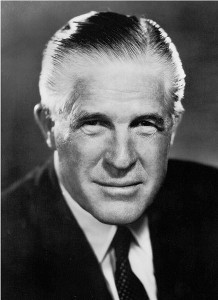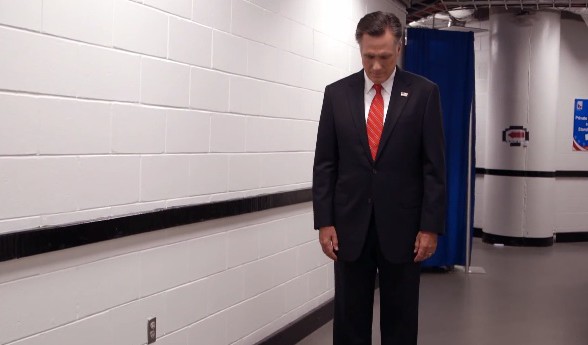Mitt, the new documentary from Netflix about the failed presidential campaign of Governor Mitt Romney, doesn’t reveal much. The film is mostly a home movie of the Romney clan as they sit around various hotel rooms. Surrounded by family, Romney appears (slightly) more human than he did on the campaign trail. There aren’t any tense strategy sessions with advisors, and no juicy bits of political gossip. Paul Ryan, Romney’s running mate, only shows up for a few scenes of awkward interaction with the governor. Mostly the viewer is left to marvel at the sharpness and uniformity of the Romney men’s chins.
One of the more revealing aspects of the film concerns Romney’s father, George Romney. The late George Romney was governor of Michigan, and lost the 1968 Republican presidential nomination to Richard Nixon. Romney’s father clearly looms large in his life. In one scene, Romney holds up his debate notes and shows how he always writes “DAD” at the top of his notes to remind him of his father. Romney says he’s “standing on his shoulders” and “it would never have entered my mind to be in politics” without his father.
This scene was intriguing mostly for what it left out. George Romney might have inspired Mitt’s zeal for public office, but how did Dad’s politics influence his son? This American Life had a great piece about Fair Housing laws, and how George Romney, as secretary of housing and urban development under Nixon, used the Fair Housing Act of 1968 to fight segregation. Going behind Nixon’s back, Secretary Romney used the law’s vague wording to force communities to desegregate or face the withdrawal of federal funds. Nixon, skeptical of forcible desegregation, eventually forced Secretary Romney out.

Mitt Romney didn’t seem to inherit his father’s passion for civil rights. Romney’s main issue has always been the economy, and the only issue he’s seen arguing passionately about in the documentary is the burden of regulation on small business. After showing his debate notes, Romney discusses his father’s humble beginnings and Mitt’s own comparative advantage of starting off with “money and education.” There is no doubt that his father’s narrative as a self-made man explains some of Romney’s belief that government gets in the way of business growth and economic mobility.
A different person might have seen George Romney’s story as evidence that government needs to do more to boost mobility, build human capital and fix injustices. Romney’s father clearly believed that, at least in some areas, an active federal government could improve lives. A more self-reflective politician than Mitt could have used George Romney’s story as a means to thoughtfully explore the proper role of government and the need to improve economic mobility. Instead, Mitt Romney famously stuck with conservative talking points and dismissed 47% of the country as “dependent on government.” President Obama, especially in the 2008 campaign, was able to draw on his life history to add depth to his views and policy positions. Romney was never able to shake the image of a man applying for a job he might not really want, and it cost him.
The best part of Mitt is seeing what it takes to run for president. The constant travel. The endless hotel rooms. Shoveling down greasy food from plastic containers. Even watching Romney tie his own tie seems odd, as if we’re expecting some pit crew of grooming specialists to swoop in before every public appearance. Like the rest of us, the Romney clan spent election night refreshing CNN to see the latest results. The biggest drama of the film might be a debate in the Romney camp about when to call the president to concede, as Karl Rove’s infamous inability to accept the truth led to a slight delay. Even during this momentary postponement of the inevitable, Romney tells an aide that he doesn’t want the Secret Service driving him after he returns home because he’d feel “ridiculous.” It’s reassuring to know that, even after an exhausting losing effort in a presidential election, the candidate can still retain some dignity.

All things corsedined, this is a first class post
Gee, I wonder who you voted for … *roll*
Leave your politics out of it.
It was a movie about what it takes to run for president, and politics was only brought into the movie when it was necessary to set the stage for how it affected Romney and his family behind the scenes.